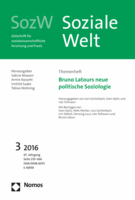
SOZIALE WELT-ZEITSCHRIFT FUR SOZIALWISSENSCHAFTLICHE FORSCHUNG UND PRAXIS
Scope & Guideline
Bridging research and practice in social sciences.
Introduction
Aims and Scopes
- Social Inequality and Mobility:
The journal extensively examines social stratification, the factors influencing social mobility, and the dynamics of inequality across various domains such as education, employment, and health. - Cultural and Ethnic Studies:
Research often explores the experiences and challenges faced by different cultural and ethnic groups, including issues related to integration, identity, and representation within society. - Educational Research:
A significant portion of the journal's output focuses on educational outcomes, decision-making processes, and disparities in educational access and achievement. - Digitalization and Society:
The journal addresses the implications of digitalization on social interactions, work environments, and individual well-being, highlighting the transformative effects of technology on social structures. - Health and Well-being:
Research related to health, including the socio-economic determinants of health, access to healthcare, and the impact of social policies on well-being, is a consistent focus. - Methodological Innovations:
The journal emphasizes rigorous empirical methodologies, including longitudinal studies and causal analysis, to provide robust insights into social phenomena.
Trending and Emerging
- Impact of Digitalization on Society:
There is a growing focus on the effects of digitalization, particularly concerning work-life balance, job quality, and social interactions, as researchers seek to understand the implications of rapid technological change. - Health Disparities and Social Determinants:
An increasing number of studies are examining health inequalities and the social determinants of health, especially in the context of the COVID-19 pandemic, highlighting the intersection of health and social policy. - Multiculturalism and Integration:
Research on multiculturalism and the attitudes towards integration of ethnic minorities is gaining traction, reflecting current debates on immigration and societal cohesion across Europe. - Educational Inequalities and Policy:
Emerging studies focus on educational inequalities, particularly in the wake of the pandemic, exploring how social origin and policy decisions impact educational trajectories. - Social Networks and Community Resilience:
There is a trend towards investigating the role of social networks in community resilience during crises, such as the pandemic, emphasizing the importance of social capital in coping strategies.
Declining or Waning
- Traditional Labor Studies:
Research focusing on traditional labor issues, such as labor unions and industrial relations, appears to be less frequent, potentially due to the evolving nature of work and the rise of gig economies. - Studies on Political Behavior:
Although political behavior remains relevant, the specific focus on political trust and voting patterns that characterized earlier publications seems to have waned, possibly overshadowed by more pressing social issues. - Gender Studies in Isolation:
While gender disparities remain a topic of interest, the specific focus on gender studies as a standalone theme is declining, as the journal increasingly integrates gender analysis across various social issues. - Historical Sociological Analyses:
There is a noticeable decline in papers that engage deeply with historical sociological analyses, as contemporary issues take precedence in the journal's thematic scope.
Similar Journals
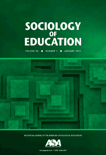
SOCIOLOGY OF EDUCATION
Connecting Critical Issues in Education and SocietySociology of Education, published by SAGE Publications Inc, stands at the forefront of research that bridges the disciplines of education and sociology. This esteemed journal, boasting an ISSN of 0038-0407 and an E-ISSN of 1939-8573, addresses critical issues within educational systems, societal structures, and their interconnections. With a remarkable impact factor reflected in its Q1 rankings in both Education and Sociology and Political Science, it continually provides a platform for interdisciplinary dialogue and innovative research. The journal's scope encompasses a wide array of topics relevant to educational practices, policy analysis, and social theory, making it an essential resource for researchers, educators, and policymakers alike. Although not Open Access, the journal remains accessible through various academic channels and is committed to maintaining high standards of scholarship as evidenced by its prestigious Scopus ranking. Since its convergence in 1996 through to 2024, Sociology of Education has solidified its role as a pivotal outlet for advancing understanding in these intertwined fields.
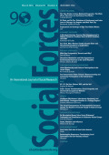
SOCIAL FORCES
Fostering Critical Dialogue in Social Sciences.SOCIAL FORCES, published by Oxford University Press, is a premier academic journal that has been shaping the discourse in the fields of Anthropology, History, Sociology, and Political Science since its inception in 1925. With an impressive Converged Years track record extending to 2024, this journal has achieved a remarkable reputation as reflected in its Q1 category rankings and high Scopus percentiles—ranking 6th in History and 11th in Anthropology. With no Open Access options currently available, SOCIAL FORCES boasts an extensive readership that values rigorous scholarship and impactful research, making it an essential resource for researchers, professionals, and students alike. Through its commitment to publishing empirical studies and theoretical explorations, SOCIAL FORCES continues to foster critical dialogue and understanding within the social sciences, positioning itself as a vital contributor to scholarly communication in the United Kingdom and beyond.
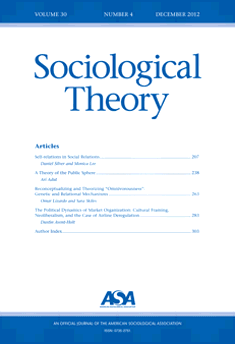
SOCIOLOGICAL THEORY
Challenging paradigms to redefine the landscape of sociology.Sociological Theory, published by SAGE Publications Inc, is a premier journal dedicated to advancing the field of sociology through innovative theoretical approaches and empirical research. With an impressive impact factor and recognized as a Q1 journal in both Sociology and Political Science, it ranks 86 out of 1466 in its category, placing it in the 94th percentile according to Scopus metrics. This journal seeks to foster rigorous debate and insight on contemporary sociological issues, welcoming contributions that challenge existing paradigms and offer new perspectives. Founded in 1996, Sociological Theory continues to push the boundaries of sociological inquiry through its commitment to quality and relevance, making it an essential resource for researchers, professionals, and students alike. Based in the United Kingdom, this journal is not an open-access publication, but it remains widely accessible through institutional subscriptions, ensuring that its valuable content reaches a global audience interested in the dynamics of social life.

JOURNAL OF POPULATION ECONOMICS
Advancing Insights into Population Dynamics and Economic TrendsThe JOURNAL OF POPULATION ECONOMICS, published by SPRINGER, stands as a leading peer-reviewed journal in the fields of demography and economics. Established in 1988, this esteemed journal offers a platform for high-quality research that probes the intricate relationships between population dynamics and economic phenomena. With its impressive Q1 quartile ranking in both Demography and Economics and Econometrics for 2023, the journal is recognized as a vital resource for scholars and practitioners alike, reflecting its rigorous standards and impact in the academic community. Its Scopus rankings position it within the top tiers of social sciences, making it an essential read for those engaged in demographic and economic research. Although the journal does not currently adopt an open access model, its esteemed reputation and continuous publication until 2024 ensure relevant and up-to-date findings contribute meaningfully to scholarly discourse. At its core, the JOURNAL OF POPULATION ECONOMICS aims to bridge theoretical insights and empirical findings, fostering an understanding of how population changes influence economic outcomes and vice versa.
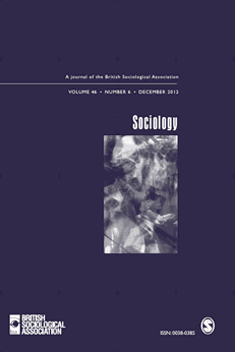
SOCIOLOGY-THE JOURNAL OF THE BRITISH SOCIOLOGICAL ASSOCIATION
Fostering theoretical innovation in the social sciences.Sociology: The Journal of the British Sociological Association, published by SAGE Publications Ltd, stands as a premier platform for the dissemination of cutting-edge sociological research since its inception in 1967. With an impressive impact factor and recognized as a Q1 journal in the fields of Sociology and Political Science as of 2023, this journal is a respected leader in its discipline, ranked #159 out of 1466 journals in its category on Scopus, placing it in the 89th percentile. The journal aims to foster understanding of social phenomena while promoting rigorous methodological and theoretical advancements. Although the journal does not currently provide open access options, it remains an essential resource for academicians, researchers, and students aiming to engage deeply with contemporary sociological issues. Addressed from the heart of London, the journal's commitment to the British Sociological Association’s mission makes it a vital contact point for fostering dialogue within the sociological community and beyond.
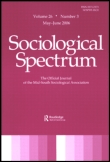
SOCIOLOGICAL SPECTRUM
Advancing critical dialogues in sociology and political science.Sociological Spectrum is a prestigious journal published by Taylor & Francis Inc, dedicated to advancing scholarship in the fields of sociology and political science. With a notable impact factor and ranked in the Q1 category for both disciplines, this journal stands out as a vital resource for researchers, professionals, and students seeking to engage with cutting-edge research and theoretical developments from 1981 through 2024. The journal’s Scopus rank places it in the top 78th percentile within the social sciences community, reflecting its significant contribution to the field. While the journal is not open access, it provides comprehensive insights and fosters critical discussions around contemporary sociopolitical issues, making it an essential avenue for scholarly communication. Published in the United Kingdom, the ISSN 0273-2173 and E-ISSN 1521-0707 editions ensure broad accessibility, serving an international audience dedicated to the complexities of societal structures.
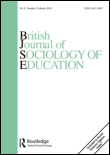
BRITISH JOURNAL OF SOCIOLOGY OF EDUCATION
Bridging Education and Social InquiryBritish Journal of Sociology of Education, published by Routledge Journals, Taylor & Francis Ltd, is a leading academic journal that focuses on the critical examination of the social dimensions of education. With a significant impact in the field, recognized by its Q1 rankings in both Education and Sociology & Political Science categories, this journal has been an essential resource since its inception in 1980 and continues to influence scholarship through 2024 and beyond. The journal's comprehensive scope invites contributions that explore the complex interplay between education systems and social structures, making it indispensable for researchers, professionals, and students committed to understanding these vital dynamics. While it currently does not offer Open Access, the journal's high Scopus rankings, placing it in the top 21% in Sociology and Political Science and the top 28% in Education, underscore its significance in fostering scholarly discourse and advancing knowledge.

Corvinus Journal of Sociology and Social Policy
Advancing Knowledge for a Better Tomorrow.Corvinus Journal of Sociology and Social Policy, published by the esteemed Corvinus University of Budapest, serves as a vital platform for scholarly dialogue in the fields of sociology and social policy since its inception in 2010 as an Open Access journal. With its ISSN 2061-5558 and E-ISSN 2062-087X, this journal invites researchers and practitioners to explore critical issues through rigorous empirical research and theoretical discussions. While currently positioned in Q4 across multiple categories including Economics, Econometrics and Finance, and Social Sciences, the journal's commitment to fostering interdisciplinary dialogue presents a unique opportunity for contributors to enhance the visibility and impact of their work. With a focus on addressing contemporary social challenges in Hungary and beyond, the journal strives to bridge gaps between academic research and real-world policy implications, making it an essential resource for students, professionals, and scholars alike. Engage with key issues and contribute to the evolving conversation at the Corvinus Journal of Sociology and Social Policy.

Zeitschrift fur Soziologie der Erziehung und Sozialisation
Advancing Understanding in Educational SociologyZeitschrift für Soziologie der Erziehung und Sozialisation, published by JUVENTA VERLAG GMBH, serves as a pivotal platform for scholars and practitioners in the fields of sociology and education. This German-language journal, with ISSN 1436-1957, focuses on the intricate relationships between education systems and socialization processes, providing a comprehensive understanding of social practices in educational contexts. Although it has ceased its coverage in Scopus, the journal has previously held ranks within the 22nd percentile for Social Sciences (miscellaneous) and the 17th percentile for Education, showcasing its niche yet significant contribution to scholarly discourse. By delving into themes such as educational inequalities, cultural influences on learning, and the sociology of teaching, the Zeitschrift für Soziologie enables researchers and educators alike to explore and address pressing issues within the educational landscape. Emphasizing empirical studies and theoretical advancements, this journal remains an essential resource for those committed to understanding and improving educational practices in a sociological context.

Papeles de Poblacion
Exploring the dynamics of population studies since 1997.Papeles de Población, published by the Universidad Autónoma del Estado de México, is a prominent open-access journal that has been advancing the field of demography since its inception in 1997. With an ISSN of 1405-7425, this journal aims to foster a deeper understanding of population studies through research articles, reviews, and critical analyses that address the complex dynamics of demographic changes, social structures, and their implications. While currently ranked in the fourth quartile of its category in 2023, it serves as a significant channel for researchers, professionals, and students to disseminate and access cutting-edge findings. Open access since 2004, it provides a platform for broader readership and knowledge sharing, thus contributing to the global discourse on population issues. Based in Mexico, the journal is committed to embracing diverse perspectives, emphasizing the importance of regional studies within a global context.